Mark Berg was a senior in high school in 1976 with no idea what he wanted to do when he grew up. There were no lawyers in his family and he hadn’t given law a thought until he accepted an internship for Dallas Co. District Attorney Henry Wade.
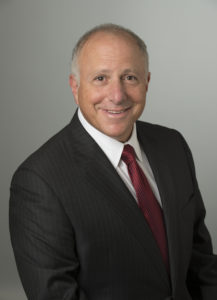
The legendary prosecutor had just created a new division that focused on career criminals, and Berg was tasked with researching evidence in cases.
“A grizzly multiple homicide had just occurred in Highland Park by a repeat offender,” he says. “The experience struck my interest in law, and I initially thought I wanted to be a litigator. Later, I realized I still loved the law but being a trial lawyer was the last thing I wanted to do.”
Forty-two years later, Berg is one of the most influential lawyers-turned-corporate executives in the entire oil and gas industry. The list of his accomplishments fills a reporter’s notebook – though he contends (over the insistence of others) that he played a small role and instead points to the great work of others.
But the “others” leave no doubt that Berg was the leader and instrumental in some monumental successes. For example:
• Berg crafted mega-international deals at Vinson & Elkins.
• He’s been the general counsel for three multibillion-dollar corporations.
• He conducted an internal investigation that led to the ouster of executives who hired him.
• He successfully negotiated a $45 billion deal, even as AIG’s Hank Greenberg attempted to stop it.
• He completed a high-risk nine-figure transaction in Tunisia, even as the government’s leaders were being overthrown.
• He played a significant role in getting the Obama administration to lift the crude oil export ban.
• And he has been instrumental in shaping the nonprofit Dallas-based CASA (Court Appointed Special Advocates) into a world-class organization that helps represent the interests of abused children in court.
Now in his 13th year at Pioneer Natural Resources, Berg has led more than a dozen major M&A deals and joint ventures that transformed the Irving-based company from a sleepy, midsized oil and gas producer into a super-major exploration and production operation. And he is leading a major initiative in West Texas designed to improve education, healthcare and quality of life issues for people who live in the Permian Basin.
“Pioneer has been such a dynamic company and you must be very nimble to be successful in the E&P business today,” Berg told The Texas Lawbook in a series of exclusive interviews.
“When I arrived at Pioneer, we operated all over the world and were a $3 billion company,” he says. “Today, we operate only in West Texas and we are a $30 billion operation. Today, we focus less on exploration and more on innovation, safety, stewardship, diversity, limiting methane emissions and being a good corporate citizen.”
Lifetime Achievement Award
In recognizing Berg’s extraordinary success as a lawyer and leader, the Dallas-Fort Worth Chapter of the Association of Corporate Counsel and The Texas Lawbook are pleased to announce that Berg is this year’s recipient of the Lifetime Achievement Award.
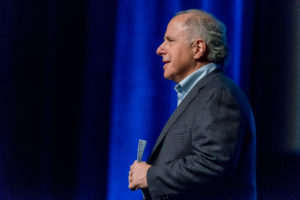
Berg is the only the second person to be honored with the Lifetime Achievement Award, which will be given to Berg at the Outstanding Corporate Counsel Awards ceremony on Jan. 24 at the Bush Institute.
“Mark is a role model and mentor, obviously for many in-house lawyers but also for all practicing lawyers,” says T-Mobile Managing Counsel Chris Luna, who chaired the 2018 Outstanding Corporate Counsel Awards.
“Mark has been successful in blending civic and community involvement but also being a great lawyer,” says Luna. “When people think of great lawyers, they think of Mark Berg.”
For Berg, who was the general counsel at Pioneer Natural Resources from 2005 until 2014 before being promoted to executive vice president for corporate operations, the two most important things in his life are family and maintaining a strong, ethical and moral code.
“Being able to identify right from wrong and then stand up for your values – that is what is important,” Berg told The Texas Lawbook in an interview in 2013. “Sometimes, the legal profession gets so focused on compliance and the specific rules that they forget to get it right.
“I’m privileged to be at a company where the corporate culture is about doing what’s right,” Berg said.
Lawyers who know Berg agree.
“Mark is devoted to professionalism and ethics and integrity,” says Mark Kleinman, who followed Berg as Pioneer’s general counsel. “He understands that high moral conduct provides a culture that is good for business.”
In addition, colleagues say that Berg has mastered his approach to M&A.
“Working with Mark in a major, highly complex transaction is like playing four-dimensional chess,” says Vinson & Elkins partner David Cohen. “He is always two steps ahead of everyone else involved in the deal. At the same time Mark takes his work and representation of the company seriously, he doesn’t take himself too seriously.
“Mark is great at making extremely complex legal issues understandable for his business executives and his board,” Cohen says.
Jeff Chapman, an M&A partner at Gibson, Dunn & Crutcher in Dallas, says Berg is extraordinarily humble.
“Many lawyers have big egos, but Mark believes in giving others credit even when he deserves the praise himself,” Chapman says. “He probably had to be talked into even accepting this award.”
Business Runs in the Family
Berg was born and raised in Dallas. His grandfather didn’t have a high school diploma but started Levines Department Stores with his brother in the late 1920s. At its peak, Levines was a publicly traded company with 120 stores across the country and competed directly with Walmart. In 1964, the business merged with Zale Corporation.
Berg’s father was a member of the “Greatest Generation.” While serving in World War II, he helped start the famous truck convoy system called the Red Ball Express, fought at the Battle of the Bulge and helped liberate Dachau, a Nazi concentration camp. He then worked for Levines and later Zales.
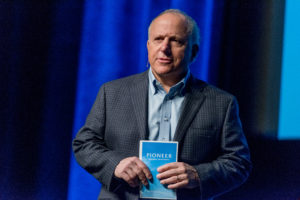
Berg’s mother was much more than just a stay-at-home mom. She and other women independently investigated the treatment of children who are separated from their parents by the court system. She helped create an organization later known as Dallas CASA.
In high school, Berg played varsity football at Greenhill School, where he earned the nickname “Ice Berg” because he was an immovable force on the frontline.
Berg majored in political science and public policy at Tulane University and then went to law school in Austin at the University of Texas.
“My grandfather called me and told me to meet him in Austin,” Berg says. “I had no idea what was going on. He took me to meet Dean [Page] Keeton of the law school. My grandfather told me that Page’s sister worked for him for about 30 years as a bookkeeper and he wanted Dean Keeton to know who I was.”
Berg gravitated toward the business law classes, including tax and contracts.
“I met Mark the first day of law school,” Cohen says. “He sat right in front of me in class. I had never seen someone so prepared and organized. He color-coordinated the tabs in his notebook. He was like a machine when it came to the detail of his note-taking in class.”
Berg graduated from UT Law in 1983 with honors.
“I decided to spend three weeks at Vinson & Elkins, never expecting to go to work at V&E,” he says. “But I quickly liked the people and the culture at the firm and accepted their offer. It was the luckiest and best decision I ever made.”
V&E put Berg to work on some of its biggest international transactions and made him a partner in its project finance group in seven years later.
“The thing I love most about being a lawyer is solving complex problems,” he says. “Next, I enjoy the commercial aspects and building strong relationships with people across the table.”
Going In-house to American General & Hanover
In 1997, Houston-based American General asked Berg to lead its 90-lawyer corporate legal department.
“I didn’t know the first thing about financial services,” he says. “Weeks after I started, Milberg Weiss and the plaintiffs bar hit the life insurance industry with a series of class-action lawsuits. I basically spent the four years I was at American General resolving class actions and building its legal and compliance functions.”
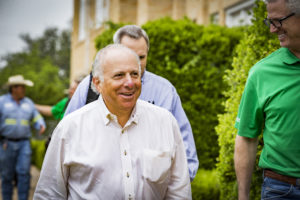
In 2001, Berg was completing American General’s sale to Prudential for $45 billion when AIG, which was run by Hank Greenberg, made an unsolicited offer to purchase American General.
“Dealing with someone like Hank Greenberg was definitely a unique experience,” Berg says. “The GC of AIG had an interpretation of an agreement that was different from mine. My secretary walked into my office and said, ‘Hank Greenberg is on the phone.’
“Mr. Berg,” Greenberg started, “I understand that you don’t agree with me on this. I want you to call a board meeting to tell them my position. What is your advice going to be to your board?”
“My advice,” Berg says he told Greenberg, “is that it would be in violation of our fiduciary duty to view it any other way than the way I interpreted it. We closed the deal before the end of the year.
“I can tell you this, those years at American General, I grew up a lot,” he says.
In 2002, Hanover Compressor Company, a publicly traded firm that specialized in natural gas compression and processing, made Berg its new general counsel. But Hanover was experiencing some financial issues and had just been forced to restate one of its reports to the U.S. Securities and Exchange Commission, which led to an SEC investigation.
Berg led Hanover’s internal inquiry. Lawyers involved say he left no stone unturned and pulled no punches with the findings, which led to the resignation of the company’s co-founders. He pushed for multiple accounting restatements that were unpopular at the time but ultimately served as the basis for successfully resolving the SEC’s investigation and securities litigation.
“Remember, this was happening at the same time as Enron and WorldCom and the passage of Sarbanes Oxley,” he says. “I had to ask the CEO and COO to resign. About half of the company respected me for my actions and the other half hated me.”
In December 2003, Hanover reached a settlement agreement with the SEC that required the company to pay no fines or penalties.
Guiding Change at Pioneer
Scott Sheffield, who was then the CEO of Pioneer Natural Resources, called Berg in 2005 to offer him the position of general counsel.
“Scott hired me, at least in part, because of my international experience,” Berg says. “But within two years, the shale revolution was underway, and we knew we had to start re-evaluating our strategy.”
Pioneer has done just that, divesting all of its geologically and politically high-risk, higher reward assets to focus on lower risk Texas-based investments.
Berg had been on the job only a year when he helped lead Pioneer’s sale of its oil and gas assets in Argentina in 2006 for $675 million. He and Pioneer’s team proceeded to divest operations and assets in the Deepwater Gulf of Mexico, South Africa, Canada and Alaska.
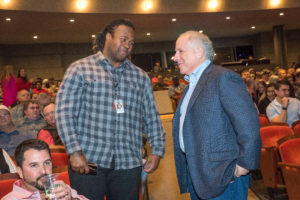
In 2011, he engineered one of Pioneer’s most difficult transactions: the sale of its Tunisian oil exploration and production assets to Austria’s largest industrial company for $866 million. The deal required government approval, but Tunisia was in chaos and its leaders were under siege from activists.
“We actually anticipated the turmoil,” Berg says. “During our negotiations, a 26-year-old set fire to himself in front of a local municipal office in Tunisia to protest mistreatment by the police. Due to the turmoil, the deal team included wording in the agreement that political unrest would not be a factor for backing out of the deal. As it turned out, the street vendor sparked the Arab Spring and the fall of the Tunisian government after we signed.
“We achieved extraordinary results in the Tunisian deal under some quite difficult circumstances,” he says.
At the same time, Pioneer aggressively acquired and developed assets in the Texas oil patch, especially the Eagle Ford and Permian shale plays. Berg and the Pioneer team engineered two groundbreaking joint ventures: a $1.3 billion JV with India-based Reliance in 2010 and a $1.7 billion JV with Chinese-owned Sinochem in 2013.
“In his early days with the company, Mark was instrumental in Pioneer’s entry into [shale by playing a] significant role in creating two important joint ventures with Reliance and Sinochem,” says Tim Dove, who is Pioneer’s current CEO.
“Since that time, he has broadened his influence into the business side of shale, with important leadership roles in vertical integration [of our pressure pumping, well services, sand and water operation], land, regulatory and compliance and corporate communication and government relations,” Dove says. “All of these have been critical to success in shale.”
In 2015, Berg and others at Pioneer played a significant role in convincing the Obama Administration to support lifting the crude oil export ban.
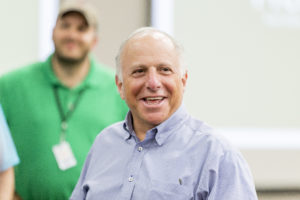
“I was told that the administration would never lift the ban, but we realized that we had a narrow window of opportunity to get it done because the renewables tax credit was expiring and we could connect the two,” Berg says. “People still do not fully appreciate the significant benefits that the U.S. has realized from this.”
During the past few months, Berg has led Pioneer’s efforts to shed the company of many of the operations he oversees. For example, Berg guided Pioneer’s sale of its pressure pumping assets on Dec. 31 to ProPetro in return for $110 million in cash and a 17 percent ownership stake in the company. Berg will serve on Pro Petro’s board. Two days later, Pioneer announced plans to decommission its Brady Sand Mine and shift its sand supply to West Texas sand sources.
“Mark is ready to tackle any problem, no matter how difficult, and solve it,” Dove says. “He is truly a high-energy ‘multi-sport athlete’ who has worked on many of the company’s most important issues and projects. As such, he has a diverse and fruitful working relationship with the entire management committee.”
Permian Strategic Partnership
In 2017, Berg undertook a new task in helping create and lead a new organization called the Permian Strategic Partnership. Pioneer, which has a huge footprint in the Permian Basin, recognized the need to become a proactive corporate citizen in West Texas.
“Midland public schools are some of the worst performing schools in Texas and Odessa schools are not far behind,” Berg says. “The roads in the Permian are horrible. Health care is substandard. Housing and the cost of living are a huge problem.”
Berg helped convince former U.S. Commerce Secretary Don Evans to chair the organization. Berg is the vice chair. Seventeen of the largest producers operating in the Permian have joined. Last year, Halliburton and Schlumberger also came on board. They’ve raised more than $100 million in start-up money.
“These issues did not occur overnight, and they will not be fixed overnight,” Berg says. “But I firmly believe we will see some huge successes soon.”
CASA – A Cause that Runs in the Family
Soon after joining Pioneer, Frank Risch, one of the company’s outside directors, introduced Berg to a non-profit organization called Dallas CASA, which stands for Court Appointed Special Advocates. The program recruits, trains and supervises volunteers who work with children who are separated from their parents as a result of neglect or abuse. Later, Berg realized Dallas CASA had actually been founded by his mother decades earlier.
“CASA is an amazing program,” he says. “All children should have the opportunity to grow up in safe homes and environments where they can become productive adults. Unfortunately, there are thousands of abused or neglected children at any time in Dallas County who have been removed from their homes due to unsafe conditions. Sometimes, the circumstances for these children have been unimaginable.”
CASA volunteers “serve as voices in the courts and the community to ensure that these children are placed in safe, permanent homes where they can thrive,” says Berg, who served on CASA’s board and became its chair.
Berg is passionate about CASA, his involvement in the Permian Strategic Partnership and his life as a lawyer and business leader.
“I love my work, but you must know this,” he says. “There is nothing – absolutely nothing – more important than my wife and two children.”
Berg and his wife, Fran, have two adult children. One is an associate at Bracewell in Houston, although Berg insists that he never encouraged either of his children to become lawyers. Instead, he pushed them to challenge themselves.
“Mark’s philosophy is simple: ‘Life is the journey, not the destination.’ And he lives by it,” says Fran Berg. “Mark truly believes that you cannot succeed unless you have failed.”
